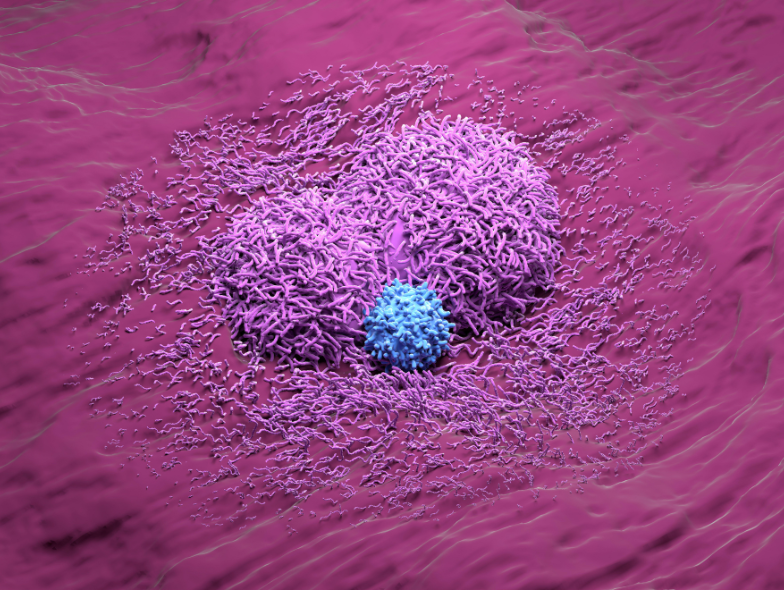Tumour microproteins could provide basis for cancer vaccines

A recent study published in Science Advances has identified a set of microproteins produced exclusively in liver tumours, which may provide a clear target for the development of a cancer vaccine.
A group of researchers from the Hospital del Mar Research Institute, Cima University of Navarra, and Pompeu Fabra University have discovered a group of microprotein molecules expressed exclusively in liver tumour cells. These microproteins may provide the basis for immune cell activation and targeting against the tumour, which could in turn be exploited to develop cancer vaccines.
Data from tumours and healthy tissue from over 100 liver cancer patients were integrated and allowed the researchers to identify the tumour microproteins. These microprotein molecules were coded by genes previously thought incapable of encoding proteins. Mar Alba, an ICREA researcher at the Hospital del Mar Research Institute, commented “In recent years, there has been increasing attention to this group of genes, which, due to their short length or low expression, were considered non-coding. New techniques have revealed that some of these genes can indeed produce small molecules.” These techniques include computational techniques like transcriptomics, proteomics, and translatomics. Laboratory experiments aimed at studying immune responses supplemented the studies.
The mechanism of cancer vaccines involves the immune system’s ability to recognise and target foreign cancer cells and the peptides they generate. However, low mutation rates in cancer cells have provided a challenge for the development of effective cancer vaccines. Microproteins, once believed too difficult to detect, can offer an alternative to researchers. “This study shows that there is a significant number of microproteins exclusively expressed in tumour cells that could be used to develop new treatments,” Marta Espinosa Camarena, a Hospital del Mar Research Institute researcher, stated.
Any potential cancer vaccine may also be used to treat many patients, as the same microproteins were expressed in several individuals. This differs from other potential cancer vaccine mechanisms that rely on patient-specific mutations. Puri Fortes, researcher at CIMA and CIBERehd, stated “We have seen that some of these microproteins can stimulate the immune system, potentially generating a response against cancer cells. This response can be enhanced with vaccines, similar to the coronavirus vaccines, but producing these microproteins. These vaccines could stop or reduce tumour growth.”
Future research hopes to further explore the application of these microproteins in developing and administering cancer vaccines.
Source:
Microproteins found in tumors could lead to cancer vaccines [Accessed July 15, 2024] https://www.eurekalert.org/news-releases/1050401
Related News
-
News US FDA adds haemodialysis bloodlines to devices shortage list
On March 14, 2025, the US FDA published an open letter to healthcare providers citing continuing supply disruptions of haemodialysis bloodlines, an essential component of dialysis machines. -
News Women in Pharma: Manufacturing personal and team success
Our monthly Women in Pharma series highlights the influential lives and works of impactful women working across the pharmaceutical industry, and how the industry can work towards making the healthcare industry and workplace more equitable and inclusive... -
News Pfizer may shift production back to US under Trump pharma tariffs
At the 45th TD Cowen annual healthcare conference in Boston, USA, Pfizer CEO Albert Bourla outlined the potential for Pfizer to shift its overseas drug manufacturing back to the US as pharmaceutical industry players weigh their options against Presiden... -
News Experimental drug for managing aortic valve stenosis shows promise
The new small molecule drug ataciguat is garnering attention for its potential to manage aortic valve stenosis, which may prevent the need for surgery and significantly improve patient experience. -
News Women in Pharma: Connecting accessible pharma packaging to patients – a Pharmapack Special
Throughout our Women in Pharma series, we aim to highlight how CPHI events encourage discussions around diversity, equity, and inclusion initiatives in the pharmaceutical industry. -
News Vertex Pharmaceuticals stock jumps as FDA approves non-opioid painkiller
UK-based Vertex Pharmaceuticals saw their stock shares soar as the US FDA signed off on the non-opioid painkiller Journavx, also known as suzetrigine, for patients with moderate to severe acute pain, caused by surgery, accidents, or injuries. -
News Trump administration halts global supply of HIV, malaria, tuberculosis drugs
In various memos circulated to the United States Agency for International Development (USAID), the Trump administration has demanded contractors and partners to immediately stop work in supplying lifesaving drugs for HIV, malaria, and tuberculosis to c... -
News 2024 Drug Approvals: a lexicon of notable drugs and clinical trials
50 drugs received FDA approval in 2024. The centre for biologics evaluation and research also identified six new Orphan drug approvals as under Biologics License Applications (BLAs). The following list picks out key approvals from the list, and highlig...
Position your company at the heart of the global Pharma industry with a CPHI Online membership
-
Your products and solutions visible to thousands of visitors within the largest Pharma marketplace
-
Generate high-quality, engaged leads for your business, all year round
-
Promote your business as the industry’s thought-leader by hosting your reports, brochures and videos within your profile
-
Your company’s profile boosted at all participating CPHI events
-
An easy-to-use platform with a detailed dashboard showing your leads and performance







